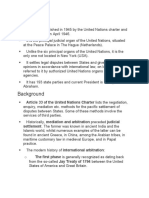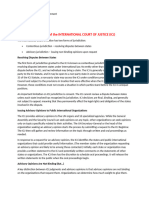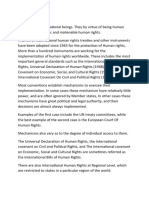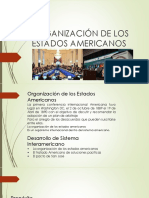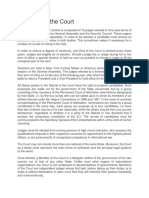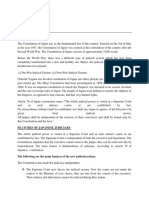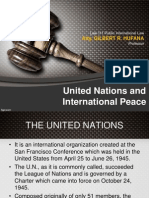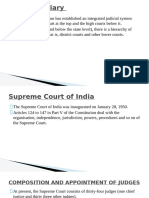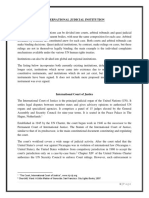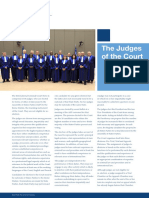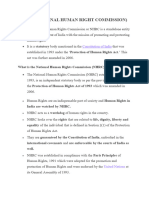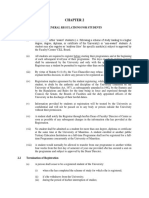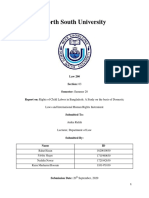International Court of Justice
International Court of Justice
Uploaded by
bhuneeCopyright:
Available Formats
International Court of Justice
International Court of Justice
Uploaded by
bhuneeOriginal Description:
Original Title
Copyright
Available Formats
Share this document
Did you find this document useful?
Is this content inappropriate?
Copyright:
Available Formats
International Court of Justice
International Court of Justice
Uploaded by
bhuneeCopyright:
Available Formats
International Court of Justice
What to study?
For Prelims and Mains: All about ICJ and comparison with ICC, Jadhav’s case and what
can India do now in this case?
Context: International Court of Justice likely to deliver verdict in Kulbhushan Jadhav
case this month.
About ICJ:
What is it?
The International Court of Justice (ICJ) is the principal judicial body of the UN.
Established in 1946 to replace the Permanent Court of International Justice, the
ICJ mainly operates under the statute of its predecessor, which is included in the UN
Charter.
It has two primary functions: to settle legal disputes submitted by States in
accordance with established international laws, and to act as an advisory board on
issues submitted to it by authorized international organizations.
Members of the Court:
The International Court of Justice is composed of 15 judges elected to nine-year
terms of office by the United Nations General Assembly and the Security
Council. These organs vote simultaneously but separately. In order to be elected, a
candidate must receive an absolute majority of the votes in both bodies. In
order to ensure a measure of continuity, one third of the Court is elected every
three years. Judges are eligible for re-election.
Who nominates the candidates?
Every state government, party to the Charter, designates a group who propose
candidates for the office of ICJ judges. This group includes four members/jurists of the
Permanent Court of Arbitration (machinery which enables arbitral tribunals to be set up
as desired and facilitates their work) also picked by the State. Countries not part of the
statute follow the same procedure where a group nominates the candidates.
Each group is limited to nominate four candidates, two of whom could be of their
nationality. Within a fixed duration set by the Secretary-General, the names of the
candidates have to be sent to him/her.
What are the qualifications of ICJ judges?
A judge should have a high moral character.
A judge should fit to the qualifications of appointment of highest judicial officers
as prescribed by their respective states or.
A judge should be a juriconsult of recognized competence in international law.
The 15 judges of the Court are distributed as per the regions:
Three from Africa.
Two from Latin America and Caribbean.
Three from Asia.
Five from Western Europe and other states.
Two from Eastern Europe.
Independence of the Judges:
Once elected, a Member of the Court is a delegate neither of the government of his
own country nor of that of any other State. Unlike most other organs of international
organizations, the Court is not composed of representatives of governments. Members
of the Court are independent judges whose first task, before taking up their duties, is to
make a solemn declaration in open court that they will exercise their powers impartially
and conscientiously.
In order to guarantee his or her independence, no Member of the Court can be
dismissed unless, in the unanimous opinion of the other Members, he/she no longer
fulfils the required conditions. This has in fact never happened.
You might also like
- Economic Development Core ValuesDocument2 pagesEconomic Development Core Valuesbhunee67% (3)
- iCJ DetailDocument10 pagesiCJ DetailMrīgendra Narayan UpadhyayNo ratings yet
- Glenn Neely - Mastering Elliott WavesDocument169 pagesGlenn Neely - Mastering Elliott Wavesnanbharath100% (2)
- Meaning and Functions of LawDocument10 pagesMeaning and Functions of LawMayank Khaitan100% (2)
- India and Icj ProjectDocument57 pagesIndia and Icj ProjectPearl BajpaiNo ratings yet
- The Jurisdiction of the ICJDocument16 pagesThe Jurisdiction of the ICJronielyn coyocaNo ratings yet
- The CourtDocument15 pagesThe CourtCelina GonzalesNo ratings yet
- Unit 3 IdrbDocument4 pagesUnit 3 IdrbKanishkaNo ratings yet
- ICJ Guide JMCMUN GenocideDocument12 pagesICJ Guide JMCMUN GenocidesunidhiNo ratings yet
- LLB, HR 2Document46 pagesLLB, HR 2Salman QadeerNo ratings yet
- ICJ DocumentDocument6 pagesICJ DocumentPihu SharmaNo ratings yet
- International Courts of Justice - Composition, ElectionDocument13 pagesInternational Courts of Justice - Composition, ElectionYashank SinghNo ratings yet
- 3.1 State Parties & State Assembly PartiesDocument11 pages3.1 State Parties & State Assembly Partiesanon_453131367No ratings yet
- What Is ICJDocument7 pagesWhat Is ICJyavanika SharmaNo ratings yet
- International Court of Justice UPSC Notes For GS II1Document3 pagesInternational Court of Justice UPSC Notes For GS II1Hafeefa SultanaNo ratings yet
- Human Ri8ghtsDocument12 pagesHuman Ri8ghtsAmanKumarNo ratings yet
- ICJ History Sem 3-WPS OfficeDocument5 pagesICJ History Sem 3-WPS OfficeDivya SkaterNo ratings yet
- Bank Agricultural University Bangladesh: Submitted To Submitted byDocument21 pagesBank Agricultural University Bangladesh: Submitted To Submitted byRabihaNo ratings yet
- 33 50afcatDocument6 pages33 50afcataradhya.shinde8cNo ratings yet
- Organización de Los Estados AmericanosDocument32 pagesOrganización de Los Estados AmericanosCristian EscalanteNo ratings yet
- Reading Note W10Document7 pagesReading Note W10ashaaban353kamalNo ratings yet
- About The General AssemblyDocument10 pagesAbout The General AssemblyAnkit YadavNo ratings yet
- UN Charter (Bodies)Document25 pagesUN Charter (Bodies)KashishNo ratings yet
- Guide Questions Module 3 First PartDocument5 pagesGuide Questions Module 3 First Partkimberly.uy.22No ratings yet
- Indian Judicial System: Group Member: AryanDocument19 pagesIndian Judicial System: Group Member: AryanAryan RanaNo ratings yet
- UNO and Its Various BodiesDocument6 pagesUNO and Its Various BodiesdeepakNo ratings yet
- 2.2 Reading Material PE & PADocument5 pages2.2 Reading Material PE & PAYashasvi SharmaNo ratings yet
- National Human Rights Commission (NHRC)Document4 pagesNational Human Rights Commission (NHRC)SaumyaNo ratings yet
- Human RightsDocument3 pagesHuman RightsudayasankaranNo ratings yet
- Polictical Science PaperDocument10 pagesPolictical Science Paperpalak asatiNo ratings yet
- Tugas Kelompok 1 Hukum InternasionalDocument2 pagesTugas Kelompok 1 Hukum Internasionalkim NanDjungNo ratings yet
- Three Branches of The Govt and The Sources of Phil. LawsDocument20 pagesThree Branches of The Govt and The Sources of Phil. LawsJonahNo ratings yet
- UN & International PeaceDocument66 pagesUN & International Peacegilberthufana446877No ratings yet
- 3 Branches of Gov JTDocument1 page3 Branches of Gov JTlaguiamudamalidasNo ratings yet
- State Human Rights CommissionDocument5 pagesState Human Rights CommissionPAVANINo ratings yet
- NHRCDocument4 pagesNHRCAniket SharmaNo ratings yet
- 3 Branches of GovernmentDocument3 pages3 Branches of GovernmentClarisse AquinoNo ratings yet
- China'S Judicial System: People'S Courts, Procuratorates, and Public SecurityDocument8 pagesChina'S Judicial System: People'S Courts, Procuratorates, and Public SecurityDrJoyjit HazarikaNo ratings yet
- Tests For Valid DelegationDocument2 pagesTests For Valid DelegationMelchor CepeNo ratings yet
- International Court of Justice IcjDocument6 pagesInternational Court of Justice IcjsimranNo ratings yet
- COI MODULE 3.5Document7 pagesCOI MODULE 3.5bharathsunilkumar7No ratings yet
- 6 Organs of The United NationsDocument2 pages6 Organs of The United NationsSakamachi KinjirouNo ratings yet
- Political Science Vi - 6th SemesterDocument44 pagesPolitical Science Vi - 6th SemesterSouvik SarkarNo ratings yet
- Assignment: Topic: The Role of Pre Trial ChamberDocument15 pagesAssignment: Topic: The Role of Pre Trial ChamberVrindha VijayanNo ratings yet
- 55rule of Law 10 August 2004Document8 pages55rule of Law 10 August 2004vuthyhNo ratings yet
- Branches of Phil GovtDocument5 pagesBranches of Phil GovtKyle BanceNo ratings yet
- Unit 2 PDFDocument17 pagesUnit 2 PDFIshant GargNo ratings yet
- Human Rights Commission in IndiaDocument5 pagesHuman Rights Commission in IndiaAnirudh PrasadNo ratings yet
- International Criminal CourtDocument4 pagesInternational Criminal CourtmillerNo ratings yet
- BASSADocument3 pagesBASSAGK JorqsNo ratings yet
- International Judicial Institution 1Document11 pagesInternational Judicial Institution 1AakashBagh100% (1)
- JudgesENGDocument8 pagesJudgesENGGilles NouziesNo ratings yet
- The Judges of The Court: ICC-PIDS-FS-04-013/18 - EngDocument8 pagesThe Judges of The Court: ICC-PIDS-FS-04-013/18 - EngSwabrah BadruNo ratings yet
- 3 Branches of Philippine GovernmentDocument3 pages3 Branches of Philippine GovernmentEnzo Ivan TILANDOCANo ratings yet
- International Court of Justice (Icj) : DR - Ahmadsudiro, SH., MH, Mm. Mariske Myeke Tampi, SH., MHDocument26 pagesInternational Court of Justice (Icj) : DR - Ahmadsudiro, SH., MH, Mm. Mariske Myeke Tampi, SH., MHRosandio DTNo ratings yet
- FAQ On ICLDocument15 pagesFAQ On ICLyoboboc736No ratings yet
- Separation of Powers and Judicial AuthorityDocument7 pagesSeparation of Powers and Judicial AuthorityneoNo ratings yet
- The 1987 ConstitutionDocument3 pagesThe 1987 ConstitutionDave Gato VestalNo ratings yet
- 10 IosDocument7 pages10 IosNourine GadNo ratings yet
- Three Braches of GovernmentDocument3 pagesThree Braches of GovernmentAra EntomaNo ratings yet
- NHRC NotesDocument11 pagesNHRC NotesVanshika ChandelNo ratings yet
- Union JudiciaryDocument10 pagesUnion JudiciaryAbhinav JDNo ratings yet
- The United States Government: A book so the rest of us can understandFrom EverandThe United States Government: A book so the rest of us can understandNo ratings yet
- Account. Business Establishments With Annual Turnover More Than Rs. 50 Crore Shall OfferDocument2 pagesAccount. Business Establishments With Annual Turnover More Than Rs. 50 Crore Shall OfferbhuneeNo ratings yet
- Comparison of The Indian Constitutional Scheme With That of Other CountriesDocument26 pagesComparison of The Indian Constitutional Scheme With That of Other CountriesbhuneeNo ratings yet
- Depository RoleDocument2 pagesDepository RolebhuneeNo ratings yet
- 6th - Maths - Term 2 - English-Www - Governmentexams.co - in PDFDocument96 pages6th - Maths - Term 2 - English-Www - Governmentexams.co - in PDFbhuneeNo ratings yet
- Std10 Science EM PDFDocument360 pagesStd10 Science EM PDFbhuneeNo ratings yet
- Disruptive Technological Innovation Will Enable India To Transform Itself. DiscussDocument3 pagesDisruptive Technological Innovation Will Enable India To Transform Itself. DiscussbhuneeNo ratings yet
- Are You Aware of The Term Securities' and Securities Markets'?Document9 pagesAre You Aware of The Term Securities' and Securities Markets'?bhuneeNo ratings yet
- Japan: What Is Ahead For Abenomics?Document24 pagesJapan: What Is Ahead For Abenomics?bhuneeNo ratings yet
- Government Launches Gram Swaraj Abhiyan... The Union Government Launched " Gram Swaraj Abhiyan Special InterventionsDocument1 pageGovernment Launches Gram Swaraj Abhiyan... The Union Government Launched " Gram Swaraj Abhiyan Special InterventionsbhuneeNo ratings yet
- Data ProtectionDocument1 pageData ProtectionbhuneeNo ratings yet
- Cbis Eis, Dss & KMDocument9 pagesCbis Eis, Dss & KMbhuneeNo ratings yet
- 18 GisDocument11 pages18 GisbhuneeNo ratings yet
- 11 DFD TypesDocument3 pages11 DFD TypesbhuneeNo ratings yet
- 8 DFDDocument6 pages8 DFDbhuneeNo ratings yet
- 120+ Profit & Loss Questions With Solution: Daily VisitDocument24 pages120+ Profit & Loss Questions With Solution: Daily Visitbhunee0% (1)
- HRM NotesDocument198 pagesHRM NotesbhuneeNo ratings yet
- Armand V Feigenbaum'sDocument7 pagesArmand V Feigenbaum'sbhuneeNo ratings yet
- Triumph Civil Action Against EatonDocument63 pagesTriumph Civil Action Against Eatoncrd1990No ratings yet
- Civil Misc Appl 47 of 00Document5 pagesCivil Misc Appl 47 of 00wakwayaNo ratings yet
- PLMDocument3 pagesPLMMyrna Coyoca AranzansoNo ratings yet
- 03.06 - atDocument4 pages03.06 - atverronabellagarcipleimitiNo ratings yet
- General Regulations For Students 2.1 RegistrationDocument12 pagesGeneral Regulations For Students 2.1 RegistrationNikhilesh KissoonNo ratings yet
- PartnershipDocument49 pagesPartnership20230773No ratings yet
- Human Rights EducationDocument12 pagesHuman Rights EducationJAYPEE ATURONo ratings yet
- Apa Quick Style Guide (Vic Uni)Document6 pagesApa Quick Style Guide (Vic Uni)elkeb89No ratings yet
- English Manual 2 - IntermediateDocument175 pagesEnglish Manual 2 - IntermediateBacila SimonaNo ratings yet
- Copyright Law of The PhilippinesDocument3 pagesCopyright Law of The PhilippinesHACK MENo ratings yet
- Corey Alston ICMA ComplaintDocument10 pagesCorey Alston ICMA ComplaintMy-Acts Of-SeditionNo ratings yet
- NUREG - CR-6372 Vol 2 PDFDocument888 pagesNUREG - CR-6372 Vol 2 PDFErich SchlenderNo ratings yet
- Manila Standard Today - Wednesday (January 9, 2013) IssueDocument18 pagesManila Standard Today - Wednesday (January 9, 2013) IssueManila Standard Today100% (1)
- PublicOffice Appointmentsclausev10Document41 pagesPublicOffice Appointmentsclausev10shelbydudeNo ratings yet
- Ordinance Curfew HourDocument5 pagesOrdinance Curfew HourJason CamaNo ratings yet
- Balance Between Fundamental Rights and Social ControlDocument16 pagesBalance Between Fundamental Rights and Social Controlhpzjj2xszvNo ratings yet
- MadronioDocument30 pagesMadronioLee JinNo ratings yet
- Advance Property Law Research Paper JDocument12 pagesAdvance Property Law Research Paper JMeetraj MahidaNo ratings yet
- Congressional Record: House of RepresentativesDocument25 pagesCongressional Record: House of RepresentativesJay BarnabyNo ratings yet
- People V ManaloDocument2 pagesPeople V ManaloJack Pabalan Delos SantosNo ratings yet
- Monthly Remittance Return of Creditable Income Taxes Withheld (Expanded)Document3 pagesMonthly Remittance Return of Creditable Income Taxes Withheld (Expanded)appipinnim100% (2)
- Social Contract RousseauDocument79 pagesSocial Contract RousseaumateustgNo ratings yet
- Isidro C. Ang - Angco, Petitioner, vs. Hon. Natalio P. Castillo, Et. Al., Respondents No. L-17169. November 30,1963 (9 SCRA 619)Document2 pagesIsidro C. Ang - Angco, Petitioner, vs. Hon. Natalio P. Castillo, Et. Al., Respondents No. L-17169. November 30,1963 (9 SCRA 619)Sheila Arenajo ArtilleroNo ratings yet
- Mot (Consideration) NorlizaDocument4 pagesMot (Consideration) NorlizaEzekiel AjaiNo ratings yet
- Etisalat Vendor Registration FormDocument12 pagesEtisalat Vendor Registration FormNasir Ahmad100% (1)
- NEFT FormDocument2 pagesNEFT Formanilmavi100% (1)
- LAW 200 Child Rights REPORTDocument11 pagesLAW 200 Child Rights REPORTRaisaNo ratings yet
- By Electronic Mail: Covington BurlingDocument5 pagesBy Electronic Mail: Covington BurlingMarketsWikiNo ratings yet
- Revenue Memorandum Order No.: Bureau of Internal RevenueDocument7 pagesRevenue Memorandum Order No.: Bureau of Internal RevenueJoyce Cariaga SalvadorNo ratings yet

